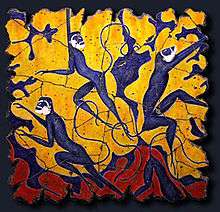Steve Bogdanoff

Steve Bogdanoff is an American artist who is internationally known for originating a modern-day technique for creating fresco secco-style artworks, and for his plaster paintings.[1] Bogdanoff is also recognized for his skill in creating self-produced limited-edition giclée prints, and has the distinction of being selected out of all of the fine artists in the United States to represent a traditional artist who produces his own giclée prints[2] in Harald Johnson's Mastering Digital Printing, Second Edition, which is considered the bible of digital printing.[3] Bogdanoff's most notable print entitled "Vive la Nouvelle-Orléans" became a symbol for the strength and resiliency of New Orleans after Hurricane Katrina destroyed much of the city, and a portion of the proceeds from the sale helped raise funds to re-build the Louisiana SPCA which was severely damaged by the storm.[4] Artist gained notoriety for his series of Minoan-influenced blue monkey frescoes.[5] In addition to the monkeys, Bogdanoff’s subjects include marine life, birds, portraits and figures.[6]
Artist owned and operated Bogdanoff Gallery in the historic French Quarter section of New Orleans from 2002 through mid-2006.[7] Artist relocated to Santa Fe, NM in June 2006, where he works out of his studio supplying galleries with inventory and creating commissioned frescoes and plaster paintings.[7]
Technique
Best known for his fresco secco-style artworks and plaster paintings, Bogdanoff shares his original technique freely in an instructional video on his website.[8]
Once Bogdanoff prepares his plaster/lime “canvas”, he rubs in numerous thin acrylic pigment washes with towels, brushes, and his palms and fingers, building up layers of the washes until he has a completed painting.[6] He then proceeds to “vandalize” his work by distressing the paint and plaster through numerous steps to achieve an appearance of antiquity, which include cracking, breaking, sanding, sawing, chiseling, sculpting, pitting, and staining.[6] After the breaking process, Bogdanoff is left with re-assembling numerous pieces of his canvas, fitting them all back together much like a jigsaw puzzle.[6] There are no faux breaks or cracks in his work.[6] The fresco is then mounted onto a customized precision-sized backing for reinforcement.[6]
References
- ↑ Art Business News, February 1, 2005; Volume 32 Number 2; Editorial Director: Suzanne Casgar
- ↑ Mastering Digital Printing, Second Edition, Author: Harald Johnson, Thomson Course Technology, ISBN 1-59200-431-8
- ↑ worldprintmakers.com
- ↑ Art Business News, March 1, 2006; Volume 33 Number 3; Editorial Director: Suzanne Casgar
- ↑ Bon Vivant, August 18, 2002; Editor: Martin Colvert
- 1 2 3 4 5 6 Elizabeth Barr, ed. (2003), Art Galleries and Artists of the South (August - October), Turner Woodson Publishing, LLC
- 1 2 Destination For Men, Spring 2007; Editor-In-Chief: Michael C. Green
- ↑ instructional video